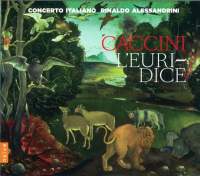Texte paru dans: / Appeared in:
*

International Record Review - (06//2014)
Pour
s'abonner / Subscription information
Naïve
OP30552

Code-barres / Barcode : 0709861305520
(ID383)
While Claudio Monteverdi's La Favola d'Orfeo of 1607 was the first operatic masterpiece, it was not the first opera. In October 1600, Jacopo Peri, a member of the Florentine Camerata of humanists, intellectuals, poets and musicians founded by Count Bardi in 1576 to discourse on art, produced L’Euridice, a play by the Florentine poet Ottavio Rinuccini sung throughout to music in the new stile rappresentativo, during the festivities for the marriage of Henri IV of France to Maria de’ Medici. He then published the work in February 1601. However, another member of the Camerata, Giulio Caccini (1551‑1618), a masterful tenor, beat him to the punch, publishing his own operatic setting of L’Euridice in December 1600, although it was not performed until December 1602. The same Caccini had already produced an opera, Il Rapimento di Cefale, which was also performed before the royal wedding couple, but three days later than Peri's. Thus Caccini, though the first to be published, was not the first opera composer. Moreover, in 1597, before all this feverish activity, Peri had already produced a drama reputedly sung in stile rappresentativo, telling the story of Apollo and Daphne (only small fragments have survived).
This new genre had arisen out of discussions in the Camerata about the way the ancient Greeks had performed their tragedies, with the characters declaiming their lines in a singsong manner to the sound of instruments often played by themselves and a chorus commenting on the action. For the theorists of the Camerata, following Plato, melody ranked third, behind the word and rhythm. Peri's version of L’Euridice largely adhered to this hierarchy by its avoidance of melodic lines, although he relied heavily on unexpected harmonies and dissonance to underline the narrative. Caccini, however, while also avoiding triple metre except in the choruses, rejected Peri's avoidance of Iyricism and virtuoso ornamentation, with the result that his opera probably appeals more to modern ears than Peri's more austere work.
Rinaldo Alessandrini's recording is only the third time that, to my
knowledge, the work has appeared on disc. The first was a modern instrument
performance recorded in 1980, which I have not heard. The second, from 2008,
is by a young Belgian ensemble, Scherzi Musicali, led by the baritone and
theorbo player Nicolas Achten, which, like Alessandrini, uses period
instruments. Alessandrini's is a live recording from the Innsbruck Early
Music Weeks of 2013 on an exceptionally quiet stage before an admirably
silent (or skilfully edited‑out) audience. It also boasts a very high sound
quality, so much so it is difficult to choose between it and the 'non‑live'
Scherzi Musicali recording. Being live, Alessandrini's version has a
distinct air of the theatre that is lacking from the other recording; but
both clearly convey the sense of audacious experimentation out of which the
work was born in 1600.
Except for the choruses, the work is written on two staves, the upper one
for the singer and the lower for the accompanying instruments. Like Achten,
Alessandrini has not added any extra parts for strings or winds. His
instrumental ensemble, slightly larger than Achten's, consists of three
theorbos, pairs of harps and harpsichords (one of these last played by
Alessandrini himself) and single bass viol, lirone, organ and regal. These
play a brief instrumental prelude to the work but are otherwise confined to
their accompanying role, which they realize with superlative style.
Alessandrini's well‑paced account of the work benefits most from the superb
singing of the veteran Italian baritone Furio Zanasi as Orpheus. He is an
expressive and affecting actor. He is also in very fine voice, rich in
timbre, lithe and supple, even in Caccini's most rapid vocal flourishes. He
surely embodies Caccini's ideal of recitar cantando (speech‑like
singing). Overall, his assured sense of Baroque style and more mature
interpretation of the role give him the edge on the much younger, though
excellent Achten, who also sings Orpheus. (Incidentally, neither
Alessandrini nor Achten, both of whom provide informative programme notes,
explains why a baritone sings the tenor role of Orpheus, which is an
increasingly common practice for early Italian opera.)
Around Zanasi, Alessandrim has assembled a cast of his regulars, all of them
older than the youthful singers of Scherzi Musicali. Unfortunately, this
means the bigger roles are disappointing, such as the wayward bass Antonio
Abete's Plutone, the sour and blustery tenor Gianpaolo Fagotto's Arcetro
(Orpheus's friend), who also has a penchant for odd ornamentation, and the
matronly contralto Sara Mingardo's Proserpina (Plutone's wife). Mingardo is
also miscast as Euridice's youthful companion, Daphne. Also unsatisfactory
is the soprano Silvia Frigato (Tragedy and Euridice), whose hard‑edged voice
is matched by ungainly delivery. Most of the others are indifferent Baroque
singers, certainly
not the
equals of Scherzi Musicali's vocal troupe, although one notable
exception is the baritone Marco Scavazza, one of the unnamed chorus of
Shepherds, who sings several characterful solos with a sure sense of early
Baroque style.
Despite the shortcomings of Alessandrini's singers, and perhaps thanks to
his outstanding instrumentalists and his attentive and poised chorus, he
manages to create a powerful music drama. Nevertheless, those singers, save
for Zanasi, Scavazza and a couple of others, do lack that hard‑to‑define
quality of sprezzatura (nonchalance) Caccini demanded for his new
singing style.
This does not mean inattentive or poorly controlled singing, but a
deportment and vocal delivery conveying, among other things, nobility,
confidence and an easy command of technique in even the most dramatically or
musically demanding passages. Scherzi Musicali's ensemble as a whole comes a
lot closer to this than Alessandrini's and is thus to be preferred.
Fermer la fenêtre/Close window
Cliquez l'un ou l'autre
bouton pour découvrir bien d'autres critiques de CD
Click either button for many other reviews


